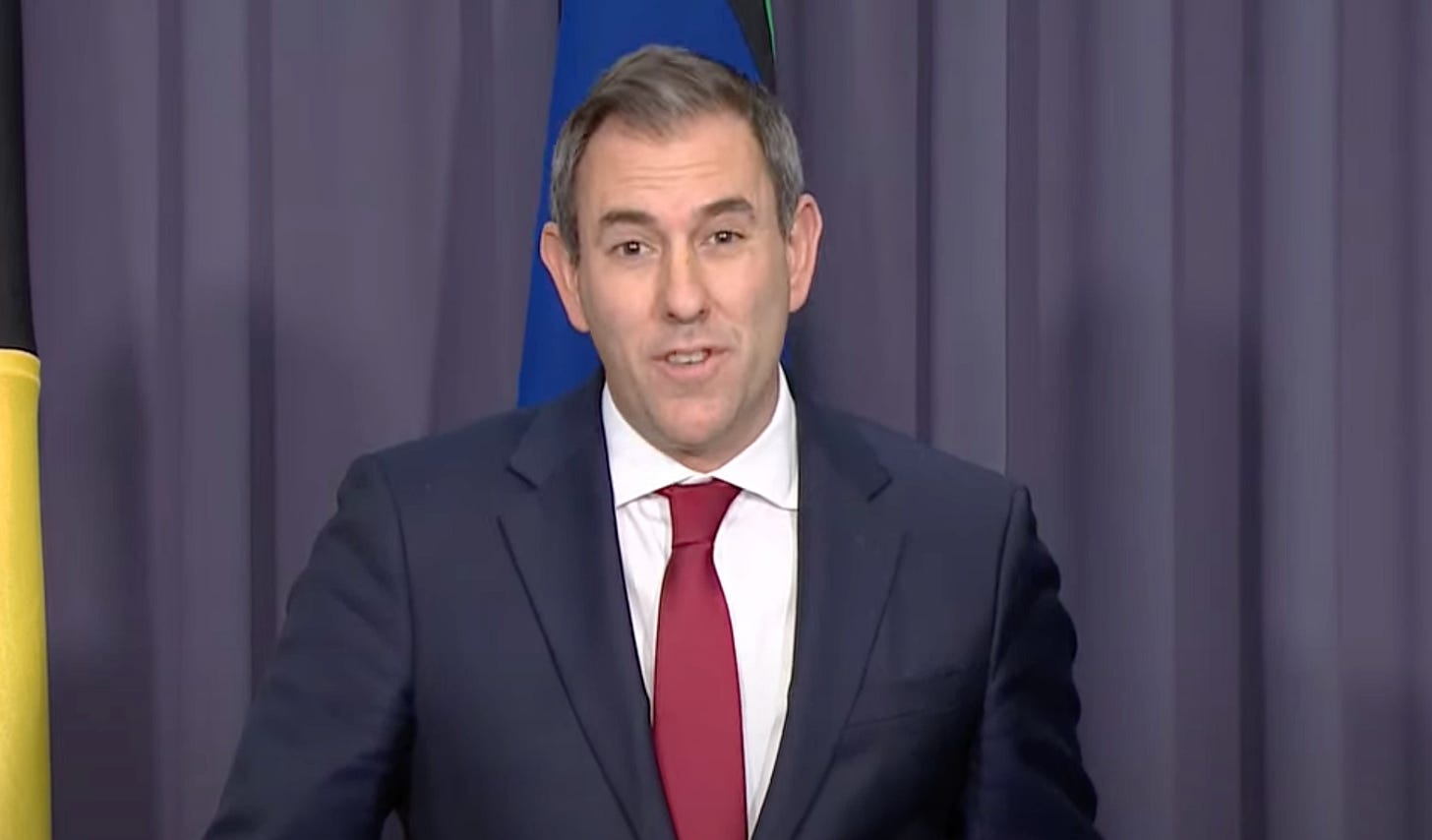Real Wages Hit Five-Year High as Government Claims Economic Turnaround
Annual wage growth reaches 1.3 percent while interest rates fall for third time in six months
Real wages in Australia surged to their strongest growth in five years, rising 1.3 percent annually through the June quarter of 2025, as the government claimed vindication for its economic policies amid falling interest rates and controlled inflation.
Treasurer Jim Chalmers announced the wage figures Tuesday alongside Employment Minister Amanda Rishworth, highlighting what he called the first sustained period of strong wage growth in a decade.
"This is the strongest annual real wages growth in about five years," Chalmers said during a press conference in Canberra. "This is the first time in a decade that we have seen four consecutive quarters of real wages growth above 0.7%."
The wages price index grew 0.8 percent in the June quarter to reach 3.4 percent higher through the year, according to official data released Tuesday morning.
Seven Consecutive Quarters of Growth
The government emphasized the sustained nature of the wage increases, contrasting current conditions with those inherited when Labor took office.
"This means that we have now seen seven consecutive quarters of real wages growth," Chalmers said. "Remember when we came to office, there had been five consecutive quarters of real wages falling. When we came to office, real wages were falling sharply, and we've been able to turn that around."
The treasurer attributed the turnaround to deliberate government policy rather than market forces alone.
"This is not accidental. This is part of the Albanese government's economic plan to make sure that we get real wages growing again," he said.
Employment Minister Rishworth said the government had delivered on campaign promises to reverse wage suppression policies.
"We made an absolute pledge to end the Coalition's deliberate design to suppress wages in this country. And we made a commitment that we would get wages moving again," Rishworth said.
Broad-Based Economic Improvements
The wage data release coincided with the Reserve Bank's third interest rate cut in six months, creating what Chalmers described as favorable economic conditions across multiple indicators.
"Yesterday we saw the third interest rate cut in the space of six months, providing meaningful cost of living relief for millions of Australians who are still under pressure," Chalmers said. "We welcome that decision taken by the independent Reserve Bank."
The treasurer outlined a comprehensive picture of economic improvement spanning inflation, employment, debt and wage growth.
"We've got inflation down very substantially now. Interest rates are falling as a consequence. Unemployment has been very low. Our real wages are growing strongly, the strongest in around five years. We've got the debt down and we're paying less interest on that debt as a consequence," he said.
Enterprise Bargaining Reaches Record Levels
Rishworth highlighted enterprise bargaining as a key driver of wage growth, saying current coverage had reached unprecedented levels.
"The most recent enterprise bargaining data shows that we have the largest number of employees covered by enterprise bargains since the inception of this enterprise bargaining came in in 1991," she said.
The minister emphasized that wage increases were occurring across economic sectors and geographic regions.
"The data also shows here that those increases, real wage increases, are both across the public and private sector, they're in all states and territories, and across different industries," Rishworth said. "This demonstrates that we are seeing real wage increases across the broad economy."
Housing Regulation Reform Advances
As part of broader economic reform efforts, Chalmers announced that the Australian Securities and Investments Commission would review a regulation potentially blocking housing investment.
The review targets RG97, a regulation requiring institutional investors to declare stamp duty costs when investing in housing, which the government says creates competitive disadvantages.
"RG97 forces investors to declare their stamp duty costs when they're making investment in housing. And that can act as a deterrent because it means that they are less competitive than other types of investors in the market," Chalmers explained.
The potential reform emerged from consultations ahead of next week's Economic Reform Roundtable, where ASIC Chairman Joe Longo heard directly from institutional investors.
"This issue was raised really by all of the institutional investors directly with the chair of ASIC, Joe Longo. And he has indicated today that ASIC will take a look at RG97," Chalmers said.
The Property Council has estimated that easing the requirement could result in 35,000 additional homes built by institutional investors over five years.
"So it has the potential to be a really important change," Chalmers said, thanking Longo and ASIC for agreeing to the review.
Truth matters. Quality journalism costs.
Your subscription to The Evening Post (Australia) directly funds the investigative reporting our democracy needs. For less than a coffee per week, you enable our journalists to uncover stories that powerful interests would rather keep hidden. There is no corporate influence involved. No compromises. Just honest journalism when we need it most.
Not ready to be paid subscribe, but appreciate the newsletter ? Grab us a beer or snag the exclusive ad spot at the top of next week's newsletter.
Economic Challenges Remain
Despite positive indicators, both ministers acknowledged ongoing economic pressures and structural challenges requiring continued attention.
"Even with this progress on wages we know that there's more work to do we know that people are still under pressure the global environment is still uncertain," Chalmers said. "Our growth in our economy is not what we need it to be and we have some persistent structural issues in our economy as well and productivity is the most important one."
The treasurer identified productivity improvement as central to sustaining wage growth and living standard increases.
"Productivity, making our economy more productive is the best way to lift living standards over time and make people better off. It's the best way to build on the progress that we've made," he said.
Tax Policy Boundaries Established
Chalmers used the press conference to definitively rule out certain tax changes, particularly regarding family homes, while reaffirming existing commitments.
When asked about economists' suggestions to tax owner-occupied housing, Chalmers rejected the proposal outright.
"There are obviously areas that no sensible government would go near, and that's one of them," he said. "We don't pretend, we don't propose to change the tax arrangements on the family home."
The treasurer emphasized the government's focus on delivering previously announced income tax cuts.
"We've got a tax agenda to cut income taxes for 14 million Australians, not once but twice. And that is our focus," Chalmers said, noting that opposition parties had opposed these measures.
Workplace Flexibility Discussions
Employment Minister Rishworth addressed recent union proposals for four-day work weeks, emphasizing existing legislative frameworks for workplace flexibility.
"Our legislative changes that we made last year actually allow for the request of employees to make flexible working arrangements and request to work flexibly. That includes compressed hours in four days," Rishworth said.
She noted that some organizations had already negotiated four-day arrangements through enterprise bargaining.
"I know that a number of organisations have entered into enterprise bargaining where they've looked at four days," she said, adding that arrangements must ensure workers don't receive reduced pay.
Roundtable Preparation Continues
Both ministers outlined expectations for next week's Economic Reform Roundtable, describing it as focused on productivity improvements while maintaining realistic parameters.
"The round table is all about making our economy more productive and more resilient and our budget more sustainable at the same time," Chalmers said.
The treasurer said extensive consultation had already identified areas of potential consensus, particularly around regulatory improvement and approval processes.
"There are also areas where there is, I think, an emerging view, a sense of some common ground. And they are around making sure that our regulation is fit for purpose, making sure that our approvals are faster," he said.
Chalmers acknowledged that some topics would remain contentious while expressing optimism about regulatory reform potential.
"There are areas which will always be contentious already in this press conference. A couple of those have been mentioned, industrial relations, tax, I think tech as well will always be contentious," he said. "But there are also areas where there is, I think, an emerging view, a sense of some common ground."
Industrial Relations Balance
Rishworth addressed questions about perceived imbalances in roundtable participation, defending the inclusion of various perspectives while maintaining government policy priorities.
"I have had in my discussions with both employer groups and unions since I've been in this portfolio, many different ideas, many different ideas, many viewpoints already," she said.
The minister emphasized that both employers and unions had been active in proposing ideas throughout her tenure.
"When it comes to industrial relations, I'll be pretty clear, no one is shy about coming forward with their ideas," Rishworth said.
She reaffirmed the government's commitment to protecting worker conditions while pursuing wage growth.
"We've been very clear about what our election commitments and how we're delivering on those election commitments, including protecting penalty rates in the awards system," she said.
The ministers positioned Tuesday's wage data as validation of government economic strategy while acknowledging remaining challenges in productivity and global economic uncertainty.
Chalmers emphasized that strong wage growth needed to become a permanent feature of the Australian economy rather than a temporary achievement.
"We want that to be an enduring feature of our economy, and part of that is making our economy more productive. That's why we're so focused on that as a government, not just next week, but every week that we are in these positions," he said.
The positive wage data and regulatory reforms represent early momentum as the government prepares for broader economic discussions at next week's roundtable, with both ministers expressing confidence about building consensus on productivity-enhancing measures while maintaining boundaries around contentious policy areas.
The sustained wage growth figures mark a significant shift from conditions when Labor took office, providing political validation for the government's economic approach as it seeks to address longer-term structural challenges through collaborative reform processes.
Got a News Tip?
Contact our editor via Proton Mail encrypted, X Direct Message, LinkedIn, or email. You can securely message him on Signal by using his username, Miko Santos.
As well as knowing you’re keeping Mencari (Australia) alive, you’ll also get:
Get breaking news AS IT HAPPENS - Gain instant access to our real-time coverage and analysis when major stories break, keeping you ahead of the curve
Unlock our COMPLETE content library - Enjoy unlimited access to every newsletter, podcast episode, and exclusive archive—all seamlessly available in your favorite podcast apps.
Join the conversation that matters - Be part of our vibrant community with full commenting privileges on all content, directly supporting The Evening Post (Australia)
Not ready to be paid subscribe, but appreciate the newsletter ? Grab us a beer or snag the exclusive ad spot at the top of next week's newsletter.










